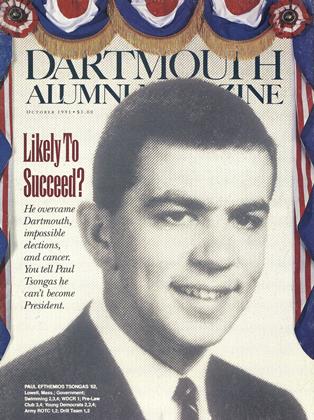"We must strive to create a world where talent tells and merit matters."
LAST JUNE I WAS ESPECIALLY happy to congratulate each member of the class of 1991 daring its Commencement. The class and I arrived at Dartmouth together, eager and doubtless more than a little apprehensive. Then, in what seems like an instant in time, we shared four stimulating and challenging years. Now, as I continue my work here, these students have moved on to the tasks of shaping their lives and making their marks.
Commencement is inevitably a moment to ask what the educational enterprise is about, what these demanding and expensive years finally mean, what lessons a college education ultimately teaches.
We are, I take it, clear that a college must be more than merely a dispenser of occupational and social credentials, more than simply a provider of the necessary currency for attaining a secure job and a proper marriage. If college is to be worth the effort, the time, and the financial cost, it must lay open the minds and souls of its students to the wondrous possibilities of growth. It must till the soil of being, so that the lessons of a lifetime fall not on barren rock but on places where they may root and thrive. College must prepare students to continue to learn for the rest of their lives, and most especially at those unguarded and surprising times when they may not be aware that they are learning at all.
Consider the words of E. B. de Vito, in a poem called "Graduates":
The poem suggests two points to me. The first is that a true education prepares men and women to grow morally and intellectually to bond into their being those epiphanies of experience that confront us, sometimes quietly, often subversively, while we are "faced the other way." The second is that a true education enables men and women to discriminate to distinguish the genuineness of jade from the falsity of imitations. These are essential capacities the abilities to grow and to judge that define the joy of being human and contribute to the formation of character and of conscience, of public lives and private selves.
What, then, is expected of those who have been privileged to acquire a college education and the renewing capacities that it instills? Many things, of course, but one especially: the obligation, as John F. Kennedy once said, to make the world safe for personal distinction.
It is personal distinction that represents the fullest flowering of our individual talents. It is personal distinction that offers us one of the earth's most sublime sources of human satisfaction. It is personal distinction that sets standards of achievement for others to emulate, that gives us our heroes. By striving to create a world that honors personal distinction a world in which talent tells and merit matters we reinforce the aspiration that a college education nurtures, and we advance the human condition.
I wish each of Dartmouth's newest alumni every happiness and satisfaction in the years ahead. May your affection for "Dartmouth undying" be with you always.
This essay was adapted from the president's Commencement address, deliveredlast June.
Knowledge comes, in a way,unsought,as in the Chinese taleof the youth who came fordaily lessonsin what there was to learn of jade.And each day, for a single hour,while he and the mastertalked togetheralways of unrelated matters,jade pieces were slipped into his hand,till one day, when a monthhad passed,the young man paused and with afrown,said suddenly, "That is not jade."As Life is something, we are told,that happens while you makeother plans,learning slips in and comes to staywhile you are faced the other way.
 View Full Issue
View Full Issue
More From This Issue
-
 Feature
FeatureMENCKEN UNBOXED
October 1991 By ROBERT SULLIVAN '75 -
 Feature
FeatureHONEST TO GOD ACCOMMODATION
October 1991 By JAMES O. FREEDMAN -
 Feature
FeatureRUNNING ON IDEAS
October 1991 By Charles Wheelan ’88 -
 Feature
FeatureThe Masked Stork
October 1991 By William DeJong '73 -
 Feature
Feature"Like Walking Along an Arrete."
October 1991 By Heather Killebrew '89 -
 Article
ArticleDR. WHEELOCK'S JOURNAL
October 1991 By E. Wheelock
James O. Freedman
-
 Article
ArticleCOACHES AND PRESIDENTS
OCTOBER 1990 By James O. Freedman -
 Article
ArticleThe Trembling Hope
APRIL 1992 By James O. Freedman -
 Article
ArticleA Lifelong Pursuit of Education
Winter 1993 By James O. Freedman -
 Article
ArticleThe Time Allotted Us
June 1994 By James O. Freedman -
 Article
ArticleObligations of the Educated
September 1995 By James O. Freedman -
 Article
ArticlePreparing for Contingencies
December 1995 By James O. Freedman







